上海新世纪版牛津译林英语八年级上册 Unit 8 Natural disaster单元测试(二)(II )卷
- 格式:doc
- 大小:246.00 KB
- 文档页数:14
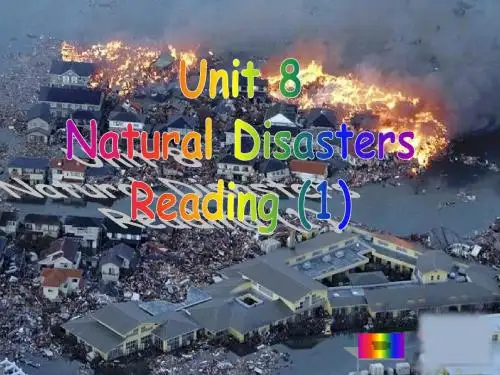
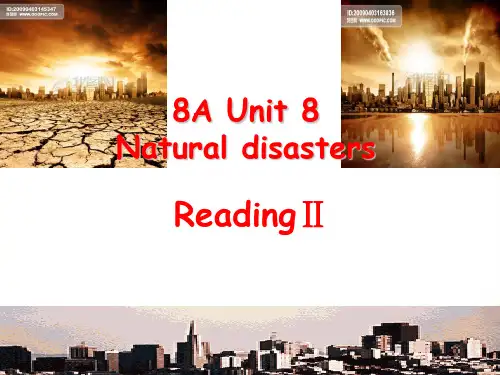
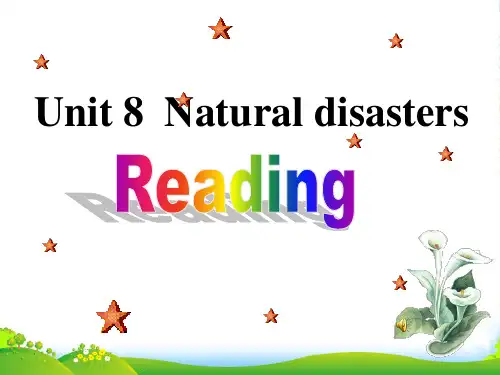
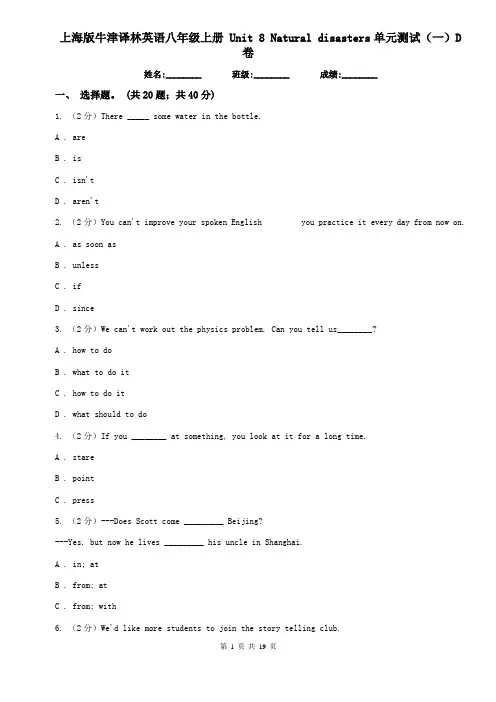
上海版牛津译林英语八年级上册 Unit 8 Natural disasters单元测试(一)D卷姓名:________ 班级:________ 成绩:________一、选择题。
(共20题;共40分)1. (2分)There _____ some water in the bottle.A . areB . isC . isn'tD . aren't2. (2分)You can't improve your spoken English you practice it every day from now on.A . as soon asB . unlessC . ifD . since3. (2分)We can't work out the physics problem. Can you tell us________?A . how to doB . what to do itC . how to do itD . what should to do4. (2分)If you ________ at something, you look at it for a long time.A . stareB . pointC . press5. (2分)---Does Scott come _________ Beijing?---Yes, but now he lives _________ his uncle in Shanghai.A . in; atB . from; atC . from; with6. (2分)We'd like more students to join the story telling club.A . 状语B . 直接宾语C . 宾语补足语D . 谓语7. (2分)—Sir, would you mind a little more slowly?—Of course not. I thought you could follow me.A . speakB . speakingC . to speakD . speaks8. (2分)— We must be strict ________ ourselves.— I think so.A . withB . onC . inD . by9. (2分)--- I'm so tired after the long journey that I want to go to bed at once. --- You'd better ______ first and then have a rest.A . take a walkB . take a messageC . take a breakD . take a shower10. (2分)—I think the environment is terrible these years.—Yes, it will be even worse the government takes action it.A . until; protectB . unless; to protectC . if; protecting11. (2分)Her mother wants her _______ the guitar every day.A . practiceB . practicingC . practicesD . to practice12. (2分)What's that English?A . inB . atC . of13. (2分)I don't really care if my friends are the same me or different me.A . as, asB . from, fromC . as, from14. (2分)-- Could you please tell me ?-- By taking an online tour.A . in which way can I improve my writing skillsB . how I can travel around the world in eight hoursC . what places of interest we can visit at a timeD . how should I get some more useful information15. (2分)You'd better take the map with you you won't get lost.A . as long asB . as soon asC . now thatD . so that16. (2分)- Could you please teach me ______ to give out “Red envelope“(红包) on WeChat ? - Sure. Let me show you.A . howB . whyC . whenD . where17. (2分)Jimmy started to play the piano at the age of five and now he is becoming init.A . the most interestedB . interested and interestedC . more and more interestedD . more interested and interested18. (2分)——We can invite our teachers to the farewell party next Saturday.——Yes, ______? I'll call them at once.A . what forB . whatC . why notD . why19. (2分)Getting a driver's license a lot of time, but many people think it's worth it.A . costsB . paysC . takesD . spends20. (2分)—Mum, I'm dying for food. Can we have dinner now?—Dear, let's wait your dad comes back.A . whenB . afterC . untilD . while二、完形填空。
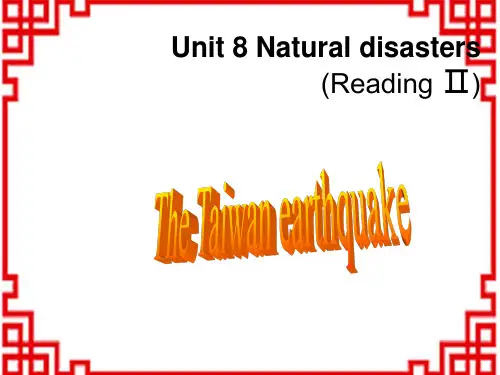
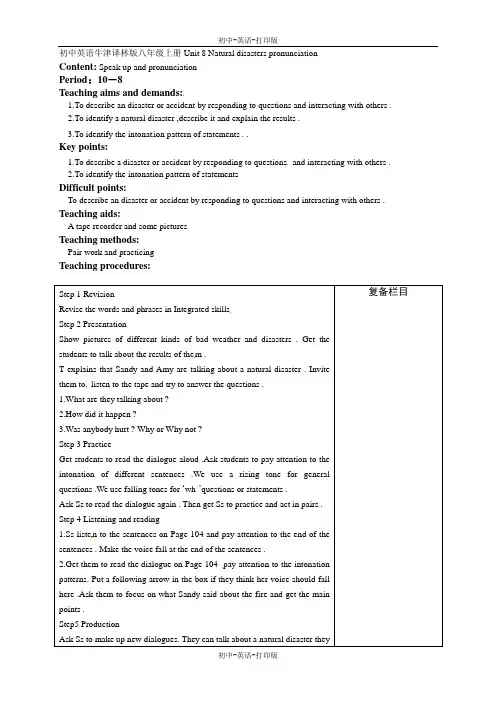
初中英语牛津译林版八年级上册Unit 8 Natural disasters pronunciationContent:Speak up and pronunciationPeriod:10-8Teaching aims and demands:1.To describe an disaster or accident by responding to questions and interacting with others .2.To identify a natural disaster ,describe it and explain the results .3.To identify the intonat ion pattern of statements . .Key points:1.To describe a disaster or accident by responding to questions and interacting with others .2.To identify the intonation pattern of statementsDifficult points:To describe an disaster or accident by responding to questions and interacting with others . Teaching aids:A tape recorder and some picturesTeaching methods:Pair work and practicingTeaching procedures:复备栏目Step 1 RevisionRevise the words and phrases in Integrated skillsStep 2 PresentationShow pictures of different kinds of bad weather and disasters . Get thestudents to talk about the results of the m .T explains that Sandy and Amy are talking about a natural disaster . Invitethem to listen to the tape and try to answer the questions .1.What are they talking about ?2.How did it happen ?3.Was anybody hurt ? Why or Why not ?Step 3 PracticeGet students to read the dialogue aloud .Ask students to pay attention to theintonation of different sentences .We use a rising tone for generalquestions .We use falling tones for ‘wh-’questions or statements .Ask Ss to read the dialogue again . Then get Ss to practice and act in pairs .Step 4 Listening and reading1.Ss liste n to the sentences on Page 104 and pay attention to the end of thesentences . Make the voice fall at the end of the sentences .2.Get them to read the dialogue on Page 104 pay attention to the intonationpatterns. Put a following arrow in the box if they think her voice should fallhere .Ask them to focus on what Sandy said about the fire and get the mainpoints .Step5 ProductionAsk Ss to make up new dialogues. They can talk about a natural disaster theykno w . Pay special attention to the intonation .Step 6 Homework1.Read the dialogues in correct intonation .2.Finish off more exercises.3.Preview Main task: find the new phrases and try to re member them.教学反思:达标检测Unit 6 Speak up and pronunciation (30’)一、用所给的汉语或英语单词的适当形式填空(9’)1.He felt cold and ___________ (frighten ), but he couldn’t move .2.They sent the __________ (受害者) to the hospital at once .3.The snowstorm started again in the afternoon and it got ______ (bad) later .4.Mrs Su hurt her leg but it was not _________ (严重的).5.The snow was heavy and it _______ (覆盖)everything .6.This morning I read a newspaper article about a car ________ (事故).7.I was surprised to see that my pet dog was still _____ (live) after the earthquake .8.The number of the _____________ (survive) of the Titanic was less than eight hundred .9.Pe ople ran in all _______ (direct) when they heard the sudden gun .二、用正确的语音和语调朗读下列句子(8’)1. Did you hear about the flood in Wuhan last month ?2. Were you alone in the car ?3.When will they arrive in Beijing ?4.How much does the baby mouse weigh ?5.Who is the busiest in your family ?6.There was water all round her house .7.He and his family moved his uncle’s house8.The whole road was covered with snow and we couldn’t get out .三、用所给动词的适当形式填空(13’)1.Who is ________ (mop) up the f loor ? It’s so clean .2.It’s unlucky ______ (lose)the game or get ______(lose) in a new city .3.We should try our best ________ (prevent) the sand from _______ (come) to the good farmland in the south .4.Timmy ________ (trap) in a dark place when the earthquake _______ (stop) .5.The radio says that the temperature __________ (drop)a little tomorrow .6.When they _______ (hear)the big noise like thunder ,they ______ (tell) themselves _______ (keep) calm .7.The firemen________ ( put) out the fire soon .8.Bad weather ________ (cause) natural disaster .。
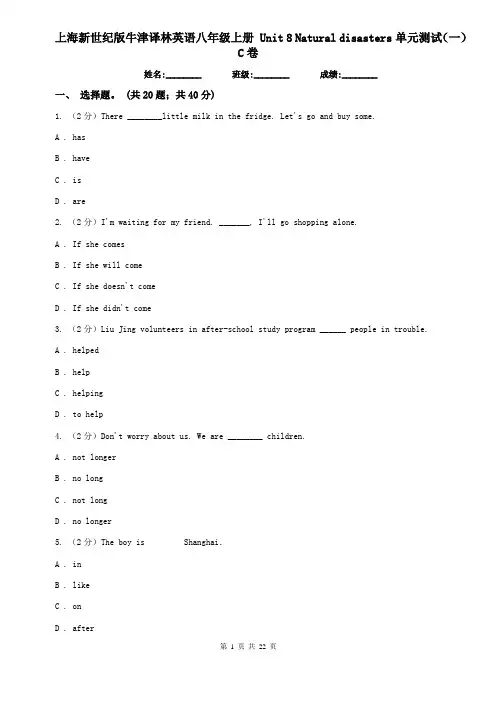
上海新世纪版牛津译林英语八年级上册 Unit 8 Natural disasters单元测试(一)C卷姓名:________ 班级:________ 成绩:________一、选择题。
(共20题;共40分)1. (2分)There ________little milk in the fridge. Let's go and buy some.A . hasB . haveC . isD . are2. (2分)I'm waiting for my friend. _______, I'll go shopping alone.A . If she comesB . If she will comeC . If she doesn't comeD . If she didn't come3. (2分)Liu Jing volunteers in after-school study program ______ people in trouble.A . helpedB . helpC . helpingD . to help4. (2分)Don't worry about us. We are ________ children.A . not longerB . no longC . not longD . no longer5. (2分)The boy is Shanghai.A . inB . likeC . onD . after6. (2分)My father _____ bus to work and it takes a long time ____ for one.A . by, to waitB . takes a, to waitC . takes, to lookD . by, look7. (2分)It is __________ difficult work __________ nobody can do it well.A . such; thatB . such a; thatC . so; thatD . so a; tha8. (2分)My aunt is a beautiful woman ________ long hair.A . hasB . inC . withD . have9. (2分)It's very quiet and I __________ there.A . enjoy to readB . enjoy readingC . hate readingD . hate to read10. (2分)— Why not riding with us tomorrow afternoon?— I would rather TV at home.A . go, to watchB . go, watchC . to go, watchD . going, to watch11. (2分)It's time _______ goodbye.A . saysB . to sayC . sayD . to saying12. (2分)Everyone _______ here now. Let's ________.A . is; to startB . is; startC . are; beginD . are; to begin13. (2分)— Where does your grandfather live?— In the countryside. He lives ____ in a big house and often feels____.A . alone; aloneB . lonely; aloneC . alone; lonely14. (2分)— Do you know ______?— Next Monday.A . when will he come backB . when he will come backC . when did he come backD . when he came back15. (2分)I didn't go to Penang Hill _____ the bad weather.A . soB . becauseC . because ofD . but16. (2分)—You seem a lot about that village.—That's true. I lived there five years ago.A . knowingB . to knowC . questioningD . to question17. (2分)The water in the lakes and rivers in Yunnan became _______ because of the dry weather.A . fewer and fewerB . more and moreC . less and lessD . little and little18. (2分)— Could you please help me with the math problems ?— __________A . Not at allB . Good luckC . No problemD . Not really19. (2分)—Do you ________ turning on the heat?—Certainly not. I feel a little cold.A . finishB . likeC . mind20. (2分)Our teachers have been with us for nearly three years _______ we came to junior high school. We should thank them for what they have done for us.A . untilB . beforeC . since二、完形填空。
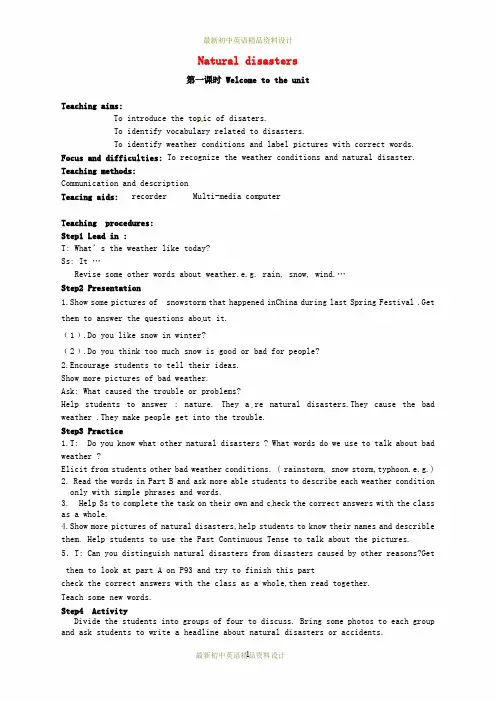
Natural disasters第一课时 Welcome to the unitTeaching aims:To introduce the top ic of disaters.To identify vocabulary related to disasters.To identify weather conditions and label pictures with correct words. Focus and difficulties: To recognize the weather conditions and natural disaster. Teaching methods:Communication and descriptionTeacing aids: recorder Multi-media computerTeaching procedures:Step1 Lead in :T: What’s the weather like today?Ss: It …Revise some other words about weather.e.g. rain, snow, wind.…Step2 Presentation1.Show some pictures of snowstorm that happened inChina during last Spring Festival .Get them to answer the questions abo ut it.﹙1﹚.Do you like snow in winter?﹙2﹚.Do you think too much snow is good or bad for people?2.Encourage students to tell their ideas.Show more pictures of bad weather.Ask: What caused the trouble or problems?Help students to answer : nature. They a re natural disasters.They cause the bad weather .They make people get into the trouble.Step3 Practice1.T: Do you know what other natural disasters ? What words do we use to talk about bad weather ?Elicit from students other bad weather conditions. ( rainstorm, snow storm,typhoon.e.g.)2. Read the words in Part B and ask more able students to describe each weather conditiononly with simple phrases and words.3. Help Ss to complete the task on their own and c heck the correct answers with the class as a whole.4.Show more pictures of natural disasters,help students to know their names and describle them. Help students to use the Past Continuous Tense to talk about the pictures. 5.T: Can you distinguish natural disasters from disasters caused by other reasons?Get them to look at part A on P93 and try to finish this partcheck the correct answers with the class as a whole,then read together.Teach some new words.Step4 ActivityDivide the students into groups of four to discuss. Bring some photos to each group and ask students to write a headline about natural disasters or accidents.Step5 Presentation1.T: Look at the pictures ,people suffered from these natural disasters . What can we do to help them.Students will discuss it warmly. Then teacher leads students to the comic strip.2.T:Hobo has some trouble. What happened to him? Let’s have a look. Students look at the pictures. Teacher asks some open questions about each picture.1).What’s the weather like?( It’s raining)2). What happened to Hobo?( He got wet.)3).What was Hobo doing when it started to rain? ( He was sleeping)4).Did he hear the rain? ( Half an hour later.)5).What do you think happened o Hobo’s house?(The floor was all wet.)6). Why doesn’t he want to go home alone?(Because he wants Eddie to mopall the water up)7).Will Eddie help him?(No. I don’t think Eddie likes his idea.)2. Play the tape and students read after it.Explain some language points.Step 5.gamesAsk students to role-play the conversation.Step 6.Homework:Revises the contents we have learned.Preview Reading8A Unit6 Natural disastersReading(1)Teaching aims:1.To infer the meaning from the key words,pictures and the context.2.To elicit any information about the earthquakes in Taiwan orin other parts of the world.3.To develop the Ss’ability and skills reading comprehension andlet the Ss learn how to describe natural disasters and how o protectthemselves in the natural disasters.Difficult points: The key words and phrases the comprehension of the story. Teaching methods: reading and talkingTeacing aids: recorder Multi-media computerTeaching procedures:Step1 Lead in :T: we have learnt some natural disastrs last time .What disasters have we leart?Encourage students to say something about the natural disasters.Show some picturs of an earthquake that happened in Wengchuan,sichuan on May12,2008 . Step2 Presentation1.Let the students guess the new words by showing the pictures and talk about the earthquake that happened in Sichuan.2.T: What do people often feel/do when the earthquake happened? etc.Teach some new words and phrases.shake v. 摇动,震动(shaking n. )hear a big noise like thunder 听到一声像打雷一样的声音in fear (be frightened) 害怕,恐惧Scream v. 尖叫run in all directions 奔向四面八方run wildly 疯狂地奔跑fall down 掉下来come down 倒塌,塌陷3.After learning these new words ,help students finish PatrB1. Check it together.4.T: There was an earthquake in Taiwan in 1999. Many people lost their lives in the earthquake , but a boy called Timmy surrived. Let’s listen to the story to see what happened to himStep3 Listening and skiming1.Play the tape for Studenets and check general understanding by asking some ‘wh’questions and doing exercises PartC.2.Students skim the passage and do exercises on PartD.Step4 Reading and answering1. Listen and read after the tape one paragraph by one paragraph.Check if they understand by asking more questions about the passage.2.Invite the students to read the whole passage in front of the class.Encourage them to mime and gesture in order to illustrate the different aspects of the experience.Step5. Practice1.Ask stuednts to read the sentences in the boxes in PartC and fill in the blanks. Check the answers with the whole class.2.Divide the students into groups of four.Retell the story ,then encourage some of them to retell in front of the class.Homework1.Recite the new words .2.Try to read the story as fluently as you can8A Unit6 Natural disastersReading(2)Teaching aims:1.To scan the passage.2.To explain some difficult and important language points and to use them.3.To make an interview about the earthquake.Difficult points: some language structuresTeaching methods: reading and talkingTeacing aids: recorder Multi-media computerTeaching procedures:Step1 revision1.Revise the names of natural disasters.2.Show the students the photos of the story of Taiwan earthquake and help them to retellit.Step2 ScanningScan each paragraph and encourage the students to tell their difficulties.Teacher helps students to solve them. Teacher explains language points to students. shaking (n.)震动,摇动Fear (n.)恐惧,害怕一阵恐惧a moment of fearin fear 在恐惧中direction方向,方位人们四处逃散。
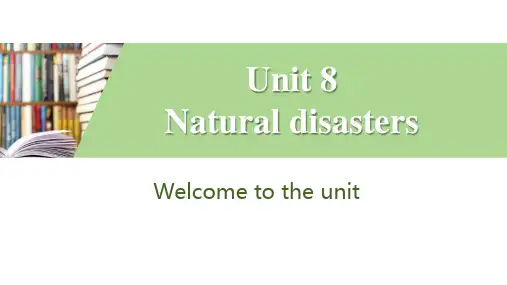
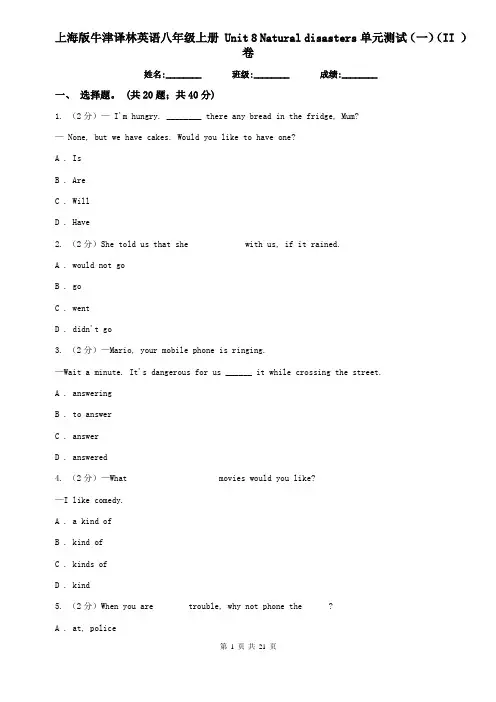
上海版牛津译林英语八年级上册 Unit 8 Natural disasters单元测试(一)(II )卷姓名:________ 班级:________ 成绩:________一、选择题。
(共20题;共40分)1. (2分)— I'm hungry. ________ there any bread in the fridge, Mum?— None, but we have cakes. Would you like to have one?A . IsB . AreC . WillD . Have2. (2分)She told us that she with us, if it rained.A . would not goB . goC . wentD . didn't go3. (2分)—Mario, your mobile phone is ringing.—Wait a minute. It's dangerous for us ______ it while crossing the street.A . answeringB . to answerC . answerD . answered4. (2分)—What movies would you like?—I like comedy.A . a kind ofB . kind ofC . kinds ofD . kind5. (2分)When you are trouble, why not phone the ?A . at, policeB . in, policemanC . in, policeD . at, policeman6. (2分)Li Lei's words made her _______.A . happilyB . angrilyC . cryingD . angry7. (2分)When the ____________ man came into the house, he found a girl ____________ here.A . older; cryB . old; cryC . elder; to cryD . old; crying8. (2分)You can call me Saturday morning. I'll be at home then.A . inB . onC . atD . of9. (2分)—— __________ hard-working girl! Who is she?——Tina. She tried to _________ many problems to learn Chinese.A . How; get onB . How a; get offC . What a; get overD . What; get out10. (2分)You should ask Bob ________ his own clothes. He is ten years old now.A . washB . washesC . washingD . to wash11. (2分)My eating habits hers.A . are the same asB . is the same asC . are same withD . is same with12. (2分)There is only in the fridge.A . some applesB . a piece of breadC . lots of meatD . any juice13. (2分)—Look! It's raining heavily! take a raincoat with you?—Well, I'll take one right now.A . Why notB . Why don'tC . Would you mindD . Would you like14. (2分)In the UK, a lady usually doesn't like to be asked ______.A . whether has she got marriedB . how old is sheC . where she comes fromD . how much she weighs15. (2分)______ Mike didn't win the race, he was still wearing a smile on his face.A . IfB . SinceC . AlthoughD . Because16. (2分)It takes them two hours ______ football every day.A . playB . playingC . to playD . plays17. (2分)The little boy is crying .A . hard and hardB . harder and harderC . hardest and hardestD . harder and hardest18. (2分)—Excuse me, how do you spell “pair”?—Sorry, I don't know.—____.A . Not at all.B . Thank you all the same.C . Yes, please.D . I'll take it.19. (2分)It rained so heavily last summer that the water in the river ______ three feet.A . raiseB . riseC . raisedD . rose20. (2分)—Could you tell me when he back?— Sure. He will come back as soon as he the classroom.A . will come; finishes cleaningB . comes; will finish cleaningC . will come; will finish to clean二、完形填空。
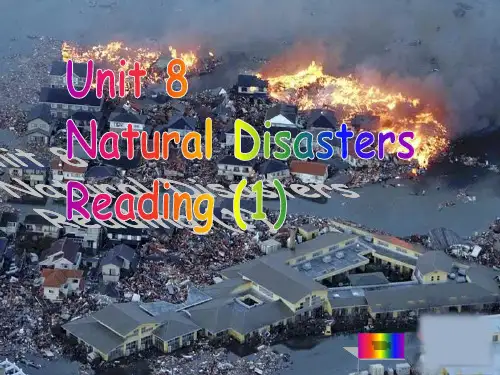
《Unit 8 Natural disasters Integrated skills》Teaching aims and demands:News words: condition, cover, caller, victim, arrival, mobile phone, serious,Phrases and sentences:the 110 receive a call from sbcrash into a treeweather conditionscover the whole roadnumber of victimsconditions of vi ctimstime of arrivalhurt her left leg9 arrive at Sunshine Hospital at 7.55 p.m.10 the snow was really heavy by then.11 call 110 using his mobile phone12 in the snowstorm13 it was not very serious14 There was a heavy storm with thunder and lighting.15 Her school caught fire because lighting hit it.16 Was she hurt?Teaching methods: task-based approachTeaching task:Learn some telephone numbers.Teaching aids: tape recorder, tapes, slide projector, slidesTeaching procedures:Task 1 Free talk.Ask the students to have a weather report in class.Task 2 Say something about the picture.Show some pictures to the students and let the students say something about the picture.Task 3 Fill in the blanks with 110 120 119 114 1211.A:“Look out ,there is a fire !” B: “Don’t worry about it. Let’s call____ hotline.2.A: “That boy fell from a tree and hurt badly.” B: “Don’t move him. Let’s call ____hotline.3.If a car crashed into a tree, we will call___ hotline.4.A: “ Today is so cold!What about tomorrow’s weather?B: “Sorry, I don’t know. You can see the weather forecast or you can call___ hotline.5.A: “I want to call Jim, but I don’t know his number.”Task 4 Listen.Task 5 Fill in the form.Accident: Their car crashed into(1)_________.They are(2)________in the car.Weather conditions: There is(3)___________and it covers the whole place.Date of call: (4)___________________Time of call: (5)___________________Name of caller: (6)__________________Place: (7)__________________No. of victims: (8)_______Conditions of victims: Mr. Su—(9)______________________________Mrs. Su----(10)____________________________Action: Policemen arrived at(11)________Sent the victims to(12)________________ at(13)____________Police ReportDate of call 28th JanuaryTime of call 7.40 p.m.Time of arrival 7.45 p.m.Place Starlight Street, Sunshine TownNo. of victims TwoConditions of victimsAction Arrived at Sunshine Hospital at 7.55 p.m.Accident: Their car crashed into(1)_________.They are(2)________i n the car.Weather conditions: There is(3)___________and it covers the whole place.Da te of call: (4)___________________Time of call: (5)___________________Name of caller: (6)__________________Place: (7)__________________No. of victims: (8)_______Conditions of victims: Mr. Su—(9)______________________________Mrs.Su----(10)____________________________Action: Policemen arrived at(11)________Sent the victims to(12)________________ at(13)____________Dear VivienHow are you? I left school early yesterday because the snowstorm started again in the afternoon and it got worse later. The snow was really heavy by then.This morning I read a newspaper article about a car accident. A man named _____ called 110 at_____ using his mobile phone. His car crashed into______ while he was driving in___________ . He and his wife were ______ in the car. The snow was _______ and it covered everything. The policemen arrived at _______ and they sent them to hospital at ______ Mr. Su felt ______and __________but he was not hurt. Mrs. Su hurt her _________but it was not very serious. Now, I know that bad weather can be dangerousWhat about London? Do you have snowstorms there? Please e-mail me soonSandyTask 6 Retell the accidentAsk the students to retell the accident without looking at their books.Task 7 Make a dialogueTASK:Please make a report on your paper, when th ey act.Then let’s share your report.Task 8 Listen to the tape, What happened in Britain?2. What caused the fire?3. Was anyone hurt? Then answer the questions:Task 9 Read the dialogue and make up new dialogueS1: Did you hear about…?S2: No. What happened?S1:… There was…S2: Oh, really?S1:Yes, it was terrible. …S2:….Task 10 Underline the useful phrasesthe 110 receive a call from sbcrash into a treeweather conditionscover the whole ro adnumber of victimsconditions of vi ctimstime of arrivalhurt her left leg9 arrive at Sunshine Hospital at 7.55 p.m.10 the snow was really heavy by then.11 call 110 using his mobile phone12 in the snowstorm13 it was not very serious14 There was a heavy storm with thunder and lighting.15 Her school caught fire because lighting hit it.16 Was she hurt?Task 11 Exercise in class.1.You _________(lose) your key inside just now, so how can you find it inside?2. The twins _____________(work) on the machine when you ______(come) in.3.They ______________(plant) 10,000 trees in 1995.4. Our knowledge of the universe __________( grow) all the time.5. No one know s what__________ (happen) in 100 years.6. Our maths teacher always tells us never ____________(lose) heart when we are in trouble. Homework1. Revise what we have learnt today.2. Copy all the phrases.3. Finish the exercise on your workbook.。
Unit 8 Natural disasters重难点精讲It’s raining. My house is all wet.句中 all wet 是“湿透”的意思,还有“大错特错”的意思。
题一:翻译:我全身都湿透了,我可以进来吗?如果你认为我喜欢你的话,你就大错特错了。
Lightning hit a classroom building and it caught fire.句中的hit是“打击、危害”的意思。
短语catch fire的意思是“烧着,着火”。
make a fire/light a fire 生火set a fire 放火题二:翻译:我扔了一块橡皮,砸到了他的头上。
没有人知道森林是如何着火的。
People screamed in fear.句中的fear表示“害怕、恐惧、担忧”。
fear sb. 与 fear for sb.前者意为害怕某人,后者意为为某人担心。
in fear of 表示“害怕、担心”。
题三:翻译:他怕他老婆。
他为他老婆担心。
我们担心会再下雪。
Outside, people were running in all directions while pieces of glass and bricks were falling down.句中的while是一个连词,连接两个并列句,表示“对比”关系。
in all directions 四面八方题四:翻译:我喜欢唱歌,而她喜欢跳舞。
他出去散步了,而我却呆在家里。
学生们从四面八方地跑进了教室。
A moment of fear went through my mind, but I told myself to calm down since I was still alive.句中的fear是______,是“______”的意思。
go through有“通过、检查”的意思。
calm down, relax, cool down题五:翻译:你现在害怕回到你自己的国家吗?他正处于非常艰难的时期。
上海新世纪版牛津译林英语八年级上册 Unit 8 Natural disasters单元测试(一)D卷姓名:________ 班级:________ 成绩:________一、选择题。
(共20题;共40分)1. (2分)In the reading room many new books.A . haveB . hasC . there isD . there are2. (2分)A tourist will easily lose his way in shanghai ________ he has a map or a guide.A . ifB . sinceC . whileD . unless3. (2分)It's necessary for you _____ exercise every day.A . takingB . to takeC . takeD . takes4. (2分)More and more people prefer ______ in the wild _____in the hotel. Because they want to experience life.A . to camp; to liveB . to camp; to livingC . camping; to livingD . camping; to live5. (2分)He swam the river, rushed the tunnel(隧道) and ran away quickly.A . over; acrossB . across; throughC . through; acrossD . across; below6. (2分)We'd like more students to join the story telling club.A . 状语B . 直接宾语C . 宾语补足语D . 谓语7. (2分)— __________ try some fish? It looks delicious.— It smells __________. I don't want to eat it.A . Why not; badB . Why don't; goodC . Why not: goodD . Why don't; bad8. (2分)________ Miss Gao's help, Meimei learns English well.A . WithB . OfC . AtD . For9. (2分)—Can you tell me the way to learn English well?— Yes, I think ________, you should love English, then you need lots of practice.A . after allB . above allC . in allD . at all10. (2分)——Haven't I told you that the computer needs______?——Sorry,I forgot_______it fixed.I'll send it for repairs right away.A . repairing;havingB . to repair;to haveC . repairing;to haveD . to be repaired;having11. (2分)Now many young people ________posting articles and photos onto the Wechat (微信) to share with their friends.A . are used forB . are used toC . used toD . get used for12. (2分)——Would you mind _________ baseball here?——Sorry. We'll go and play in the park.A . not playingB . playingC . not to playD . not play13. (2分)Last week, our sports meeting our parents and they thought of us.A . was open to; highB . was open to; highlyC . was open for; highD . was open for; highly14. (2分)Mary asked her friend Jane ______________________.A . who did Jack stay with in Shangri-LaB . why is Shangri-La so popular with peopleC . where Shangri-La(香格里拉)isD . how Bob usually travelled to Shangri-La15. (2分)It's difficult to make your dream come true you can live bravely, excitingly and imaginatively.A . althoughB . onceC . ifD . unless16. (2分)—What is the end of the story?—The person with theft was seen in court.A . was charged; appearB . charged; to appearC . was charged; to appearD . charged; appear17. (2分)After the rebuilding,our school is becoming .A . more and more beautifulB . beautiful and beautifulC . more beautiful and beautifulD . the more beautiful18. (2分)—It's time for lunch, Mum! I am hungry.—_________A . I'm sorry to hear that.B . OK. Let's make some sandwiches.C . That's all right.D . Never mind.19. (2分)---Could I your bike?--- Sorry, I it to Jim yesterday.A . borrow; lentB . lend; borrowedC . lend; lent20. (2分)You'd better make a good plan ___________ you take a holiday.A . beforeB . duringC . untilD . After二、完形填空。
牛津译林版-英语-八上-8单元Naturaldisastersintegratedskills初中英语牛津译林版八年级上册Unit 8 Natural disasters integrated skillsContent: In tegrat ed skillsPeriod:10-7Teaching aims and demands:1.To understand the process of producing an accident report form.2.To grasp the key expressions used in an emergency call and an accident report.3.To know more about what to do at the time of meeting an accident.Key points:1.The key expressions used in an emergency call.2.How to make you rself safe when there is an accident, a natural disaster or other dangerous things. Difficult points:1.The methods of keeping oneself safe from an accident or a disaster.2.Teaching methods: listening and task-based methodsTeaching aids:A tape recorde rTeaching methods:Listening and discussi onTeaching procedures:复备栏目Step 1 Revision1.Revise the past continuous tense with some exercises.2.Talk about different kinds of weather and disasters with some pictures. Getthe students to guess what bad weather or a disaster can c ause or start.Step 2 PresentationShow a picture of a snowy day and get the students to answer the questions.1.Is the world all white? (Teach the word ‘cover’ )2.How is the weather? ( Teach the word ‘condition’ )3.What may happen in this kind of days? ( T each the phrase and the word‘fall over,victim’ )4.What will you do if there is an accident? ( Teach ‘hotline, mobile phone,caller, serious’)Step 3 Listening and completing1.Get the students to listen to the tape carefully.2.Ask the students to complete part of the accident report form in Part A1 onPage 102.Step 4 Asking and answeringGet the students to listen to the tape again and answer the followingquestions:1.What was the date of the call/the time of the call/the time of arrival/theplace of the accident/the name of the caller?2.What were the weather conditions?3.How many victims?4.How are the victims now?5.What did the policemen do?Step 5 PracticeGet the students to complete the accident report form on Page 102.Step 6 Production(Pair work)1.Ask the students to read the information on Page 102. Then get them tomake up a dialogue between an interviewer and Mr. or Mrs. Su with thequestions like the following:What happened to you, Mr. Su?Were you alone in the car?Why didn’t you get out by yourself?Was anyone hurt?Did you call someone for help?Wh at do you think caused the accident?2.Act out the dialogues.Step 7 Practice(Completing)Get the students to complete the e-mail in Part A3 on Page 103 according tothe information on P age 102..Ask the students to read the e-mail on Page 103.Step 8 PracticeGet the students to discuss the ways of staying safe when there are someother disasters?Do some consolidation exercises.Homework:1.Make a report form when there are other accidents or disasters.2.Finish the rest exercises.3.Revise what you’ve learnt in this period.4.Get ready for the next period:Make up similar dialogues like the one on Page 103./When do we drop ourvoice when we speak?教学反思:达标检测Unit 6 Integrated skills (40’)一、用所给单词的适当形式填空:(16’)1. the policewomen (watch) the traffic or (have) a rest from seven to nine yesterday morning?2. Jim (draw) a picture in his room at 4 yesterday afternoon.3.---What you (do) during the Spring Festival?----I (visit) Thailand at that time.4. ---Why didn’t you go to the party last night?---I (wait) for an important call from Shanghai.5. What you (do) when I knocked at the door?6. While my mum (cook), my dad (read) newspapers.7. While/When the children (have) lessons, the earthquake (start).8. While Daniel (make) a snowball, he (fall) over.二、根据所给提示或单词,用其适当形式填空:(11’)1. All of us were excited about his (arrive).2. Ability is one of the (condition) of success(成功) in life.3. The teacher looked at the students (serious).4. Look, snow c everything. How beautiful!5.The fish smells t . Throw it away, please.6. The c of my health stops me from working.7. Don’t worry, madam. There’s nothing s .8. He called the 110 (热线) at 7:40 p.m. (use) his (手机).9. The building caught fire because lightning (hit) it.三、将下列短语译成英文:(10’)1.撞到一棵树上2.盖住所有的东西3.打电话人的姓名4.受害人的数量5.受害人的情况6.又冷又怕7.打110热线8.用手机9.坏天气可能很危险10.读报上有关汽车事故的文章四、将下列句子译成英语:(3’)1.在那次地震中,遇难者人数超过一万人。
上海新世纪版牛津译林英语八年级上册 Unit 8 Natural disaster单元测试(二)(II )卷姓名:________ 班级:________ 成绩:________一、单项选择。
(共15题;共30分)1. (2分)The Qingming Festival which is also called______Pure Brightness Festival, falls on April 5 every year, it is______time-honored tradition(悠久的传统) for the Chinese to honor their ancestors.A . The; aB . /; theC . The; theD . /; a2. (2分)- Do you know the latest information about Flight MH370?- I've no idea. Let's the TV to watch the news programme.A . turn onB . turn downC . turn upD . turn off3. (2分)My mother is ill. I have to care for her at home.A . worry aboutB . look likeC . look forD . look after4. (2分)—Which do you like better, McDonald's or KFC?—_______, I just like Chinese traditional food.A . BothB . EitherC . NeitherD . None5. (2分)—The government will focus on solving the problem of heavy burdens on the students.—That's good news for us. We have too much work to do after school.A . give a hand toB . give attention toC . take part in6. (2分)—Do you know sound travels very fast?—Yes. But light travels _______ sound.A . as fast asB . fast thanC . much faster thanD . slower than7. (2分)Eating and drinking on Beijing subway is not allowed. If you the rule, you'll face a fine (罚款) of up to 500 yuan.A . brokeB . breakC . will breakD . have broken8. (2分)Jane volunteers her time _________ the plates.A . to washB . washingC . washedD . be washed9. (2分)In the near future, there will be __________ new buildings in my hometown.A . hundreds ofB . hundred ofC . two hundredsD . two hundreds of10. (2分)---- Could I invite my friends to a party?---- Yes, of course you _ .A . canB . couldC . must11. (2分)He was born _______ the morning _______June 3, 1900.A . in; ofB . on; ofC . on; atD . at; on12. (2分)——What do you think of the talk show last night?——I didn't watch it. I ______ mum with some chores.A . helpedB . was helpingC . have helped13. (2分)My mother often _____ me ____ housework on Sunday.A . make… doB . makes …doesC . makes …do14. (2分)—The sign tells people to keep off the grass.—But many people still walk on the grass.A . stay away fromB . stand next toC . leave behind15. (2分)-Could I borrow your camera?-________, but please give it back by Saturday.A . I'm sorryB . Of courseC . Certainly notD . No, thanks二、完形填空。
(共1题;共10分)16. (10分) What's your idea about success? Some people say that beginners have all the luck, while others believe that success1 only with practice. In fact, I fell both of these statements are not true all the time. Each is true in some ways 2 not in others.For example, I went to a drawing competition many years ago and 3surprisingly. As a prize, I got a film ticket to see “Titanic”. I was really 4because it was the first time I had taken part in any competition, Thinking that I might be lucky again, I 5 joining in other art competitions, ‘But the result was that I 6 won again. I accepted the fact that the other people had a 7 artistic ability than I did. Art was not something I was especially interested in and I had never practiced the different art skills. So, the 8 I produced were not of a very high standardThese experiences taught me a lot. Though I might have been lucky9, I also need to put in hard work. As we know, 10akes perfect. So I believe success builds on less luck and chance.(1)A . movesB . comesC . returnsD . leaves(2)A . orB . soC . andD . but(3)A . wonB . beganC . failedD . ended(4)A . sorryB . activeC . luckyD . nervous(5)A . triedB . forgotC . stoppedD . remembered(6)A . oftenB . everC . sometimesD . never(7)A . greaterB . more naturalC . lowerD . more common(8)A . resultsB . filmC . prizesD . drawings(9)A . at lastB . at mostC . at firstD . at least(10)A . chanceB . practiceC . differenceD . experience三、阅读理解。
(共1题;共6分)17. (6分) Hearing live music is one of the most pleasurable experiences availableto human being. The music sounds great, it feels great, and you get to watch the players as they play it. No matter what kind of music you love, try listening to it live.This guide focuses on classic music, a tradition that originated before recordings, radio, and the Internet, back when all music was live music. In those days live human beings performed for other live human beings, with everybody together in the same room. When heard in this way, classic music can have a special excitement. Hearing classic music in a concert can leave you feeling refreshed and energized. It can be fun. It can be romantic. It can be spiritual.Classical music concerts can seem like snobby(高傲的)affairs full of foreign terms and unusual behavior. It can be hard to understand what's going on . It can be hard to know how to act. But don't worry. Concerts are no stranger than any other amusement, and the rules of behavior are much simpler and easier to understand than the stock market, football, or system software programs.If you haven't been to a live concert before, or if you've been confused by concerts, this guide will explain, so you can relax and enjoy the music.(1)From Paragraph 1, we can see that the writer encourages us _______.A . towatchthemusicianstomakemusicB . toexperiencethespiritofclassicalmusicC . toattendliveconcertsandenjoylivemusicD . togetpleasurefromdifferentkindsofmusic(2)Which of the following can replace the underlined word “originated”in Paragraph 2?A . listenedB . startedC . performedD . disappeared(3)The writer considers that live classical music _______.A . isfullofforeigntermsB . istoodifficulttounderstandC . isstrangerthanotheramusementsD . isexcitingtobothplayersandlisteners四、阅读与回答问题。